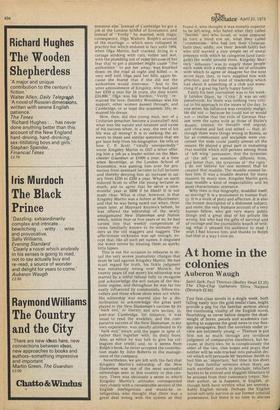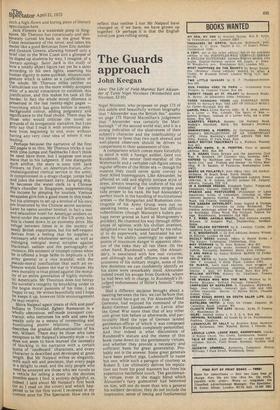At home in the
colonies
Auberon Waugh
Saint Jack, Paul Theroux (Bodley Head £2.25) 'he Chip-Chip Gatherers Shiva Naipaul (Deutsch £2.95) Two first-class novels in a single week, both falling easily into the gold medal class, might provide a peg for the familiar sermon about the continuing vitality of the English novel, flourishing as never before despite the deadweight of bores, pseuds and academics conspiring to suppress the good news in our Sunday newspapers. Both the novelists under review are extremely young — Theroux is put first not so much through any invidious judgment of comparative excellence, but because, at thirty-two, he is conspicuously the older of the two. One hopes and prays that
. neither will be side-tracked into pseudish drivel which will persuade Mr Seymour-Smith to hail him as ' important,' but time is too short for these familiar sermons when there are such excellent novels to proclaim, reluctant buyers to be enticed and sluggish librarians to be aroused from their customary torpor. Neither author, as is happens, is English, although both have written what are unmistakably English novels. Perhaps the English novel will only survive in our former colonial possessions, but there is no time to discuss
such a high-flown and boring piece of literary speculation here.
Jack Flowers is a waterside pimp in Singapore, Mr Theroux has consciously and deliberately turned his back on the great West Coast renaissance of the novel, and takes his model like a good Britonian from Eric Ambler and Graham Greene, allowing himself only a brief visit to the West Coast and a glimpse of its doped-up students by way, I imagine, of a . literary apology. Saint Jack is the study of how a totally abject figure can yet be a saint according to his own lights, asserting his human dignity in some quirkish, idiosyncratic gesture which is taken as a justification of the whole. Mr Theroux relies neither on Catholicism nor on the more widely accepted ethic of a social conscience to establish this Justification, and this makes his task all the harder. In fact the whole moral dilemma is Presented in the last twenty-eight pages — everything which has gone before is merely background colour, adding poignancy and significance to the final choice. There may be those who would criticise the novel on grounds of its inorganatic narrative, but I can only say that I read it with enormous pleasure from beginning to end, even without having any very clear idea of where it was leading. Perhaps because the narrative of the first 222 pages is so thin, Mr Theroux tricks it out With time-jumps and flashbacks I don't think he need have done, but I suppose one must leave that to his judgment. If one disregards such artifice, the story is soon told: Jack Flowers, ne Fiori, an American-Italian, after undistinguished clerical service in the army,
IS compromised in a drugs charge, jumps bail
and joins the merchant navy. Jumping ship,
he becomes the water clerk to a Chinese
Ship's chandler in Singapore, supplementing his income by pimping for tourists. Various escapades give him a good name in this trade: but his attempts to set up a brothel of kis own. Are frustrated by the Chinese secret societies: Later he opens another brothel, in fact a rest and relaxation hotel for American soldiers on leave under the auspices of the US army, but this is closed down in an economy drive. His refuge between times is in the society of seedy British expatriates, but his self-respect derives from a feeling that he supplies a necessary add wholesome service, as well as indulging vestigial moral scruples against blackmail, sadism and the pornography of violence, His moment of triumph comes when he is offered a huge bribe to implicate a US army general in a vice scandal, with the Pseudo-moral justification that such an ex
iPosure would hasten the war in Vietnam. His own morality is thus pitted against the morality of an entire generation of highly moralistic Americans. Mr Theoroux does not betray his novelist's integrity by knuckling under to the bogus moral passions of his time, I am happy to say. He writes beautifully and I hope he keeps it up, however little encouragement the may receive.
Shiva Naipaul again treats of rich and pool' Indians in Trinidad. Egbert Ramsaran is a Wholly obnoxious, self-made transport contractor, who terrorises his wife and uses his wealth only as a means of tormenting and humiliating poorer relations. The novel describes the gradual dehumanisation of his son, Wilbert. There may be those who take exception to Mr Naipaul's leisurely style — he does not seem to have learned the necessity of blocking in his narrative with a certain: quota of ' cardboard ' characters, and every Character is described and developed at great, length. But Mr Naipaul writes so elegantly, With such wit and precision, that every page is a delight to read, and the only people who
Lneed be annoyed are those who see novels as a vehicle for telling a story in the shortest Possible space. I find it entirely delightful, as, ipnedneeded, I said about Mr Naipaul's first book (or so I read on the cover) and which hapto be the first novel I reviewed in my current stint for The Spectator. How nice to
reflect that neither I nor Mr Naipaul have changed or, if we have, we have grown up together. Or perhaps it is that the English novel just goes rolling along.



































 Previous page
Previous page